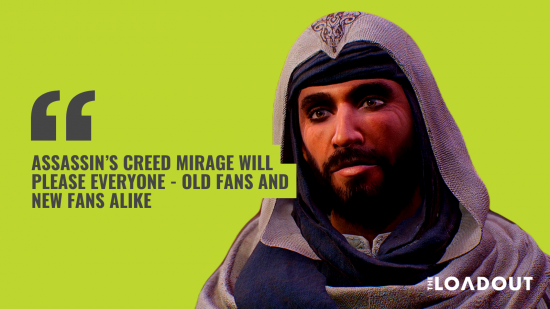It’s no secret that Ubisoft’s recent Assassin’s Creed games haven’t quite been as popular as they could be with long-time fans of the franchise. Sure, the series’ developer has been presenting players with some of the best open world games out there with Origins, Odyssey, and Valhalla. However, can these really be considered among the best Assassin’s Creed games if they’re so far removed from the gameplay pioneered by the series 16 years ago (and not always focused on the Assassin’s themselves)? Well, however you feel about the current crop of Assassin’s Creed games, you really should do yourself a favor and play Assassin’s Creed Mirage when it comes out.
After playing the early stages of the game for close to three hours in a hands-on Assassin’s Creed Mirage preview, it’s hard not to think that this is a near-perfect Assassin’s Creed game and a wonderful amalgamation of everything Ubisoft has done with the series so far.
The first aspect of Assassin’s Creed Mirage I want to discuss is the gameplay itself; this is something of an elephant in the room that could make or break the experience for a lot of long-time fans of the series. With early reports claiming that Mirage is adopting the Unity parkour system, but rigid gameplay footage showing that this game is clearly built in the same engine as Valhalla, it has been quite hard to get a proper read on what Mirage is actually going to play like. The two are, at least when it comes to this series, near-polar opposites.
Unity’s gameplay is slick and smooth, with extravagance and stealth presented to players in equal measure. Valhalla’s, however, is robust and hard-hitting, impactful and aggressive. Sure, they’re from the same series, but they’re quite different when it comes to actually playing them.
Mirage, however, is going to please everyone – old fans and new fans alike. It’s something of a culmination of the gameplay presented to players through the Assassin’s Creed series over the years. In this release, Ubisoft is bringing together gameplay mechanics and features from all eras to deliver one of the most complete Assassin’s Creed experiences yet.
It might sound a little trivial, but you can sprint freely and independently from free-running. You can crouch-walk without needing tall grass to offer you cover. You can dodge and roll, avoiding incoming attacks, without being fully locked into a restrictive counter-based combat system. If you need some assistance with reconnaissance, you can call on Enkidu, your eagle, to scope out escape routes, mark enemies, and even highlight any interesting loot. These might seem like rather mundane mechanics in isolation, but they’re all things from the RPG era that Ubisoft is marrying with older mechanics like social stealth and puzzle climbing. Mirage feels reminiscent of the series’ origins, while being undeniably modern.
That same sentiment can be applied to combat too, which is as punishing as it is rewarding. Swordplay in Mirage doesn’t operate on the counter-based system utilized by older Assassin’s Creed games, but it’s not the free-form hack-and-slash experience we were met with in the RPG era either. Just like all things, Ubisoft has balanced the two.
In Mirage, even the most basic of enemies have a health bar higher than you’d expect – and a stagger bar for you to deplete. This can be done through hack-and-slash style gameplay, with dodging a huge part of avoiding incoming attacks. However, you can also parry your opponents attacks, opening them up to a very satisfying instant-kill move. It might sound a little contradictory on paper, but in practice this is a counter-based combat system akin to what we see in earlier Assassin’s Creed games. It’s just one with more freedom to choose your method of attack. You can wait for the opportune moment to strike and chip away at your enemies, or you can confront the problem head on with an onslaught of sword slashes, slowly dismantling your enemies’ defenses and lowering their stagger bar. Or, you can risk your own wellbeing and try to parry an opponent’s attack, thus opening them up for a visceral elimination.
With Basim not having too much health to play with, and his only lethal ranged attack being a throwing knife, you’re quietly encouraged to consider the stealthy approach to almost every combat scenario. If you miss a handful of parry moves, you’re looking at desynchronization – and death, of course. However, as I experienced in a short gameplay sequence showing Basim training in Alamut during my preview, Basim can wield a blade and wield it well. As long as you’re prepared to retreat when you get overwhelmed, you can try your hand at open combat and enjoy some very satisfying – and rather vicious – kill animations utilizing both sword and dagger.
Narratively, too, Mirage is something of a culmination of all the stories told through the Assassin’s Creed series prior. It’s a story about a charming protagonist, yearning for more from life, joining the Assassins, despite seeming an ill-suited candidate, and adopting the tenets of the creed and carrying out its mission against unfavorable odds. It’s about protecting a society being eaten from the inside out by an opposing force bent on hoarding power through corruption and oppression. It’s classic ‘Assassins versus Templars’, even though the groups go by the precursor names Hidden Ones and The Order of the Ancients respectively.
However, as always, these things are never quite black and white. From what I was able to experience during my preview, of which I saw Basim as a street thief in Anbar, a trainee in Alamut, and an apprentice in Baghdad, Assassin’s Creed Mirage is going to deliver an engaging narrative with depth, suspense, and surprise. Basim is a haunted individual, someone who’s asked to work in the shadows to serve the light, but is afraid of what lurks in the darkness.
In a training report on Basim I found while exploring Alamut between objectives, Master Roshan (who appears to be Basim’s primary teacher within the organization), explains that he dreads what he might find in the shadows, despite his duty as a Hidden One requiring him to operate within it. Basim is someone afraid of the plunge, something undoubtedly symbolized by his initial failure to properly perform a leap of faith (which isn’t always the case in Assassin’s Creed games).
This training report ultimately paints Basim as a conflicted character – and one I can’t wait to learn more about. He’s outgoing, yet guarded. He’s arrogant, yet afraid. This is only one small detail, a small written document that’s easy to miss when playing, but it’s a fantastic summarization of what lies beyond Basim’s witty remarks and charming smirk.
You might not be met with the same level of freedom as Baldur’s Gate 3 and Starfield, but it’s hard to imagine a world where Assassin’s Creed Mirage isn’t going to be considered as one of the best RPG games of the year. I know I have only really experienced a small slither of what this game has to offer, but it really does feel like Ubisoft’s landmark series at its finest. From the characterization of the protagonist and the visuals of his haunting visions, to the soundscape of a busy Baghdad and the intricate environmental design, everything is working together to create something special here. This isn’t exactly Assassin’s Creed going back to basics – this is Assassin’s Creed striking a wonderful balance between the old and the new.




